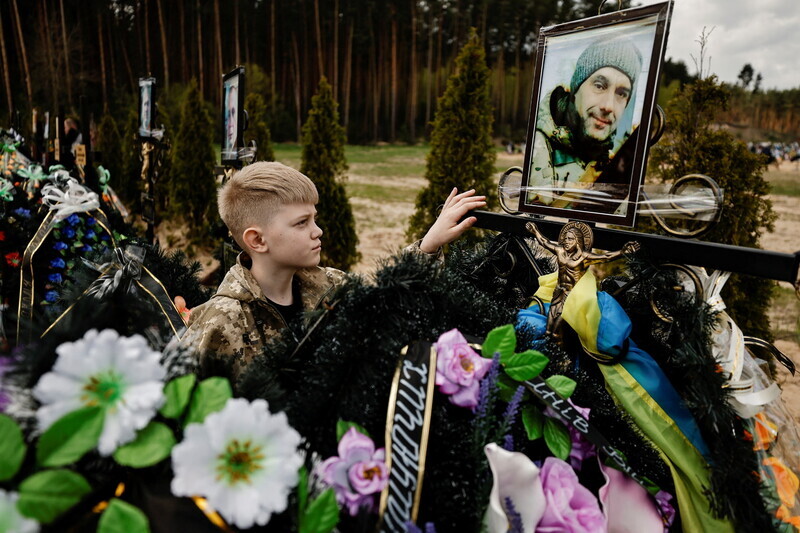hankyoreh
Links to other country sites 다른 나라 사이트 링크
[Column] Punishing Russia or saving Ukraine?


By Jung E-gil, senior staff writer
Though all wars tout desperate need or lofty values, they ultimately conclude in a messy mire of cruelty.
Russia cited its desperate need to defend itself from NATO’s eastward expansion and other threats from the West as its logic for invading Ukraine. But paradoxically, this has led to the consolidation and further expansion of NATO for the foreseeable future, as neutral countries like Finland and Sweden announced their intention to join the military alliance. With the West, including the US, accelerating its move to sanction Russia and support Ukraine in order to protect the latter from the former, the international economy faces intensifying challenges while the war escalates.
“For God’s sake, this man cannot remain in power,” US President Joe Biden said on March 26, referring to Russian President Vladimir Putin. “We want to see Russia weakened,” US Secretary of Defense Lloyd Austin said on April 25. “If Ukraine did choose to target logistics infrastructure for the Russian army, that would be legitimate under international law,” British Defense Secretary Ben Wallace said on April 28.
Russia’s response to such calls from the West for regime change in Russia and attacks against the Russian army has been even more antagonistic. On April 25, Russian Foreign Minister Sergey Lavrov said that the threat of nuclear war not only exists, but the “danger is serious, real,” and “we must not underestimate it.” He also said on Friday that conflict with NATO will only increase the threat of nuclear war.
Why did the war in Ukraine actually begin? Ukraine wanted to rise up as a sovereign nation independent from Russian threats, while Russia didn’t want Ukraine to become the bridgehead of the West, a threat to its security, while the West wanted to maintain the neoliberal international order that the existing borders represented. The equilibrium point of this trilateral conflict of interest is saving Ukraine. Neutralizing Ukraine is the solution.
Though French President Emmanuel Macron tried to mediate Ukraine’s neutralization before the war, the US cold-shouldered this move, saying France was out of line. Only when the war began was a principled neutralization agreement reached on March 29 after peace talks in Istanbul. But the massacre in Bucha has put negotiations on hold, and the West and Russia are heading towards escalating war. The US seems to want to take this opportunity to do something about Russia. After retreating from the front line in Kyiv, Russia has opted to win territory in southern and eastern Ukraine in order to force the country into becoming landlocked.
The US wants to take care of Russia because it believes Russia’s invasion of Ukraine threatens the neoliberal international order. Though sanctions are the US’ greatest weapon that wields incredible power, there’s a big chance they will backfire. Ruthless sanctions against North Korea, Venezuela, and Iran failed to change those countries.
Sanctions against Russia, which represents one axis within the geopolitical order of the world, may end up eroding the neoliberal international order even more in the long run. Russia, China, India, Iran, and others are on their way to establishing a payment system of their own that would sidestep the dollar. In the long run, the vast resources these countries possess, such as petroleum, gas, and food, may serve as weapons that can help them set up an order independent of the US-led neoliberal world order. Though countries participating in sanctions against Russia account for two-thirds of the world economy, their population only amounts to 14% of the world population.
Those who provoke war should be punished. But in reality, such punishment demands further sacrifices from the invaded. The more weapons the West provides to Ukraine and the more battles Ukraine wins against Russia, the bigger the suffering and damage experienced by Ukraine will become. Winning battles doesn’t even guarantee Ukraine’s victory in its war with Russia as a whole.
Though sanctions and military pressure will bloody and weaken Russia, they will cause the world to become divided into blocs that would bring down the neoliberal international order and demand much more Ukrainian blood than Russian blood in the long run.
True victory for the West would be a Ukraine whose sovereignty and security are guaranteed. That is the Ukraine that would ultimately serve the interest of the West. In order to prevent this, the situation should be guided towards Ukraine’s neutralization while ensuring as little as possible damage occurs. Russia should make clear the conditions under which it would end the war and withdraw its troops. The more Russia obsesses over winning Ukrainian territory, the bloodier the war will become, and the further the possibility of the end of war will recede.
During the Korean War, Douglas MacArthur, who commanded the UN forces, argued for the bombing of Manchuria and the invasion of China’s coasts by the Taiwanese army. Comparing what would have happened if MacArthur had his way and the economic prosperity South Korea achieved in reality after the armistice makes clear what true punishment is, and what actually served to ward off the communist forces.
If the war in Ukraine continues into the long term, innocent citizens will pay the price while a turf war rages between Ukraine and Russia. This is why Noam Chomsky said that the only alternative to the destruction of Ukraine and perhaps even nuclear war is an “ugly negotiated settlement” that will give Putin a way out.
But we live in an inverted present in which the extremely realistic goal of saving Ukraine through negotiations is mocked by idealists advocating for empty pacifism.
Please direct questions or comments to [english@hani.co.kr]

Editorial・opinion
![[Column] Season 2 of special prosecutor probe may be coming to Korea soon [Column] Season 2 of special prosecutor probe may be coming to Korea soon](https://flexible.img.hani.co.kr/flexible/normal/500/300/imgdb/original/2024/0426/3317141030699447.jpg) [Column] Season 2 of special prosecutor probe may be coming to Korea soon
[Column] Season 2 of special prosecutor probe may be coming to Korea soon![[Column] Park Geun-hye déjà vu in Yoon Suk-yeol [Column] Park Geun-hye déjà vu in Yoon Suk-yeol](https://flexible.img.hani.co.kr/flexible/normal/500/300/imgdb/original/2024/0424/651713945113788.jpg) [Column] Park Geun-hye déjà vu in Yoon Suk-yeol
[Column] Park Geun-hye déjà vu in Yoon Suk-yeol- [Editorial] New weight of N. Korea’s nuclear threats makes dialogue all the more urgent
- [Guest essay] The real reason Korea’s new right wants to dub Rhee a founding father
- [Column] ‘Choson’: Is it time we start referring to N. Korea in its own terms?
- [Editorial] Japan’s rewriting of history with Korea has gone too far
- [Column] The president’s questionable capacity for dialogue
- [Column] Are chaebol firms just pizza pies for families to divvy up as they please?
- [Column] Has Korea, too, crossed the Rubicon on China?
- [Correspondent’s column] In Japan’s alliance with US, echoes of its past alliances with UK
Most viewed articles
- 1After election rout, Yoon’s left with 3 choices for dealing with the opposition
- 2Why Kim Jong-un is scrapping the term ‘Day of the Sun’ and toning down fanfare for predecessors
- 3Two factors that’ll decide if Korea’s economy keeps on its upward trend
- 4Noting shared ‘values,’ Korea hints at passport-free travel with Japan
- 5AI is catching up with humans at a ‘shocking’ rate
- 6Why Korea shouldn’t welcome Japan’s newly beefed up defense cooperation with US
- 7‘We must say no’: Seoul defense chief on Korean, USFK involvement in hypothetical Taiwan crisis
- 8[Column] Season 2 of special prosecutor probe may be coming to Korea soon
- 9Korea’s 1.3% growth in Q1 signals ‘textbook’ return to growth, says government
- 10Exchange rate, oil prices, inflation: Can Korea overcome an economic triple whammy?